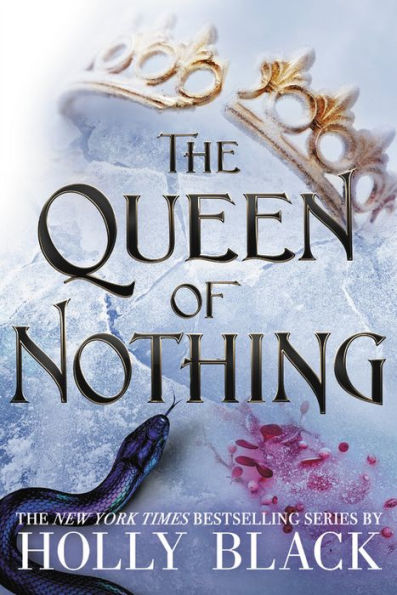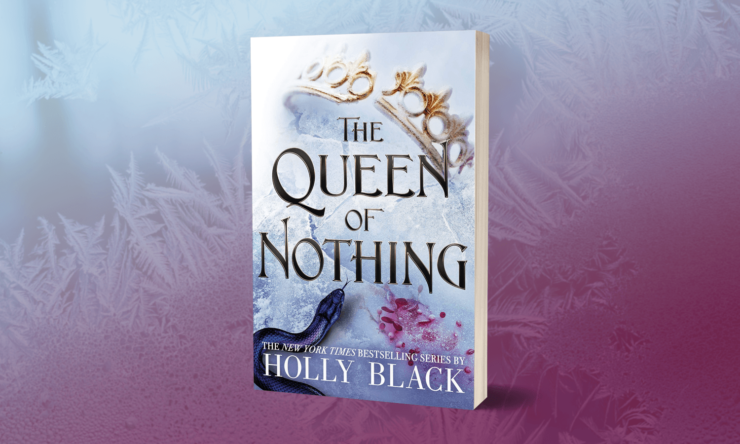Jude is the exiled, mortal Queen of Faerie: married to Cardan in exchange for releasing him from his vow to her but betrayed not long after, sent to live with her siblings in the human world outside of the court. She’s left reeling and embarrassed by her own foolishness, unsure of how to regain her throne, when opportunity arrives in the form of her desperate twin sister Taryn. As it turns out, Taryn finally had enough of her awful faerie husband Locke and murdered him, but she can’t lie under glamour like Jude can so she begs her to intercede in secret.
Eager for the chance to slip back into faerie against the terms of her banishment, Jude agrees to help Taryn. However, when she returns to Elfhame it’s clear that war is brewing between her father Madoc and Cardan, resting on uncertain alliances with Undersea and the other Courts. It doesn’t take long for her to become caught up once again in the fight for succession, except this time, she’s not just defending Cardan’s throne. She’s defending her own.
The ongoing conflict between Jude, Madoc, and Cardan—among a massive host of other allies and enemies—comes to a heady, dramatic conclusion in The Queen of Nothing. The end of the prior novel saw Cardan exerting control over the land as the rightful King to stop one battle in its tracks; this book also invokes the power of the throne in magical and metaphorical terms. Madoc has allied himself with the northern Courts while the coalition between Undersea and Cardan’s kingdom remains tenuous, to say nothing of all the smaller courts. Plus, as Jude notes after being kidnap-rescued by Madoc in place of Taryn: she’s pissed because it’s her throne that her adoptive father is after, too, not just Cardan’s.
There’s more on the line than a desire to defend the young man she, to her own chagrin, cares for. She’s got a vested interest in consolidating her own power—and to that end, she goes through a series of rescues, intrigues, and violent machinations to secure her place alongside Cardan as ruler of Elfhame. The democratic conflict between blood succession and a people’s desire for a good ruler comes to a head in a way that delighted me, by the end of the series, because monarchies have inherent flaws that Jude isn’t unaware of (and neither is Cardan).
Buy the Book


The Queen of Nothing
Black is, after all, concerned first and foremost in this series with power: who wields it and how, how it damages people or rescues them, what it means to grasp for it or give it up. She doesn’t pull punches or shoot for low-hanging fruit in the answers to those questions, either. None of our protagonists are without fault or flaw, and none of them makes entirely good choices for good reasons, but that’s what makes them so interesting. They’re human and fallible but attempting to do the right thing when possible.
Spoilers follow.
On that note, reconciliation is a significant force for growth throughout the novel and not as a mere throw-away resolution. Taryn and Jude sort through some of their issues with each other, though not all; more surprising, Jude and Nicaisa come to an understanding that each cares for Cardan and that it serves them better to work in concert. Vivi and Heather’s relationship, which has been rocky since the events of the second book, also involves a great deal of failure, compromise, and negotiation to make up for betrayals of trust. Apologies aren’t enough in this series. Only doing the labor of changing and making amends is enough, and even then, old wounds don’t disappear. I specifically appreciate the effort Black has put into maintaining relationships in families and friendship and romantic attachments between women. It ain’t easy, but it’s worth the effort.
Having a comfortable familiarity with faerie stories involving riddles and curses, the actual conclusion of the novel wasn’t much of a twist, but I suspect it wasn’t intended to be. Jude’s decision redoubled the negotiation that occurs during the earlier sex scene: given the offer to dominate Jude based on his old fantasies, Cardan chooses the path of shared control instead. Jude, when offered the opportunity to cage Cardan and bend him to her will, trapped as a serpent to secure her throne and authority over both him and the court, chooses his freedom in death over dominating him utterly. And, in reward, he is reborn from the corpse of the serpent—his blood was spilled and a new ruler born from it, et cetera.
The dynamic push-and-pull of control and desire that binds Jude and Cardan is handled with care that doesn’t detract from its heat or edge. When dealing with trauma, erotic attachment, and power dynamics both inside and outside the intimate space, it’s hard to strike a balance between “this is not okay, this is okay, this is how they find a healthy place to negotiate their needs.” To do that successfully in a young adult novel, given constraints on the amount of sexuality and violence therein, is impressive. Black explores a dynamic between Jude and Cardan that is messy but tender, at turns cruel and kind, as the pair of them try to strike a balance between their desire to dominate, or be dominated, and to form a fair partnership around it in turn.
The literal sacrifice at the end—and the trust it involves—is more of a metaphor than not, in this case. I also appreciated the casual fuck-ups of their dynamic throughout the series that lend the relationship a deeply relatable stupidity. For example: Cardan thinking it would count as a flirtation to best Jude at her own games when he exiled her because it would be attractive to provoke her the same way she does him… which instead exacerbated her actual fears of rejection and being played for a fool so badly that she missed the clue that she could’ve pardoned herself at any time and come back.
As a series revolving around trauma survivors falling for each other as well as an actual faerie kingdom war of succession, The Folk of the Air balances two disparate stories in one cohesive whole. It’s well-paced, sharp without being performatively cruel, sexy, and dynamic. Black’s taut prose serves the political intrigues and romantic tension equally, tugging the reader along through a break-neck narrative arc. The only counterpoint I’d make, there, is that the first book has room to sprawl that allows the characters to develop more while the second and third books are aggressively lean with a bit less of that interpersonal depth, driven at a fast clip through the actual (violent, complicated) succession plot.
Despite that, I found the series itself well-balanced. Jude as a protagonist is also just so refreshing. She’s ruthless but vulnerable, unapologetic about defending herself and her throne unto death if necessary, even against her adoptive father. It’s not often I see young women written with both the emotional depth and the competent brutality that Jude balances inside herself, and even rarer to see those young women allowed to fall in love and negotiate a functional partnership with shared control. That’s the sort of thing that draws me to Black’s novels as a whole, and I wasn’t disappointed at any stage of the story.
The Queen of Nothing is available from Little, Brown Books.
Lee Mandelo is a writer, critic, and editor whose primary fields of interest are speculative fiction and queer literature, especially when the two coincide. They have two books out, Beyond Binary: Genderqueer and Sexually Fluid Speculative Fiction and We Wuz Pushed: On Joanna Russ and Radical Truth-telling, and in the past have edited for publications like Strange Horizons Magazine. Other work has been featured in magazines such as Stone Telling, Clarkesworld, Apex, and Ideomancer.










